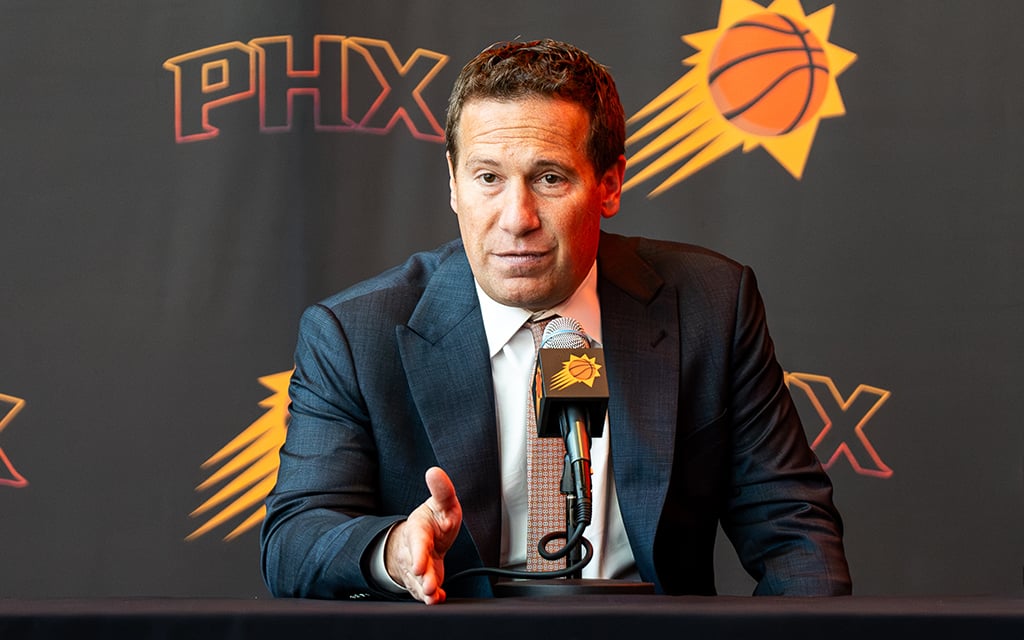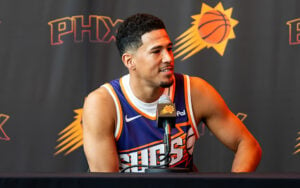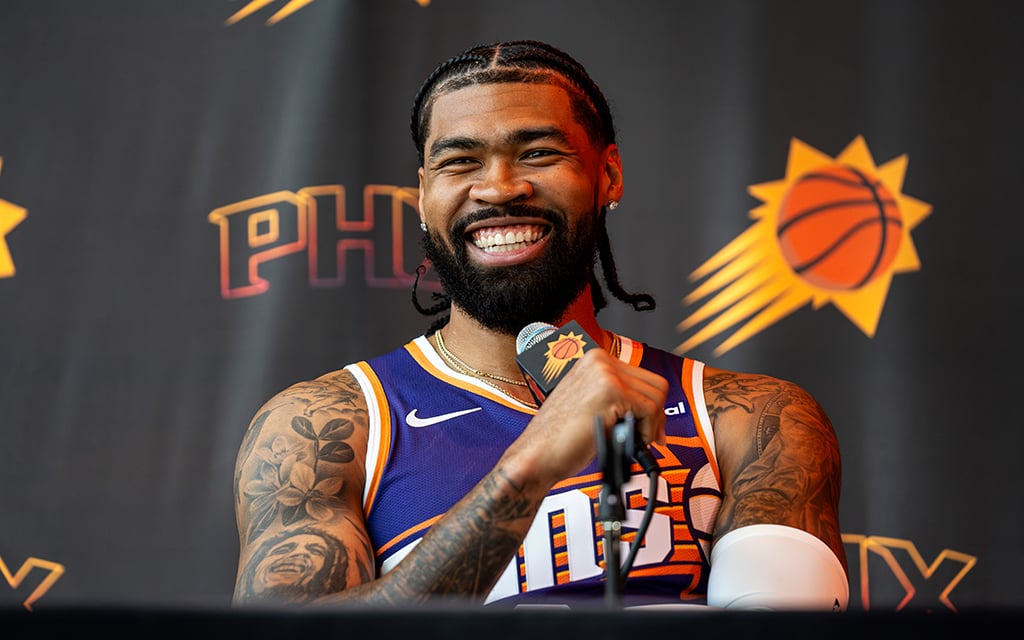
Phoenix Suns owner Mat Ishbia speaks about the direction of his organization at the team’s media day Wednesday at PHX Arena. (Photo by Hana Kaufman/Cronkite News)
PHOENIX – The Phoenix Suns entered 2024 built like a superteam and left resembling a cautionary tale. What was supposed to be a coronation turned into a collapse. With the acquisition of Bradley Beal to pair with Kevin Durant and Devin Booker under championship coach Mike Budenholzer, the season felt like title-or-bust.
Instead, the “Big Three” never materialized.
Beal’s play was sloppy, scoring was below par, Budenholzer lost the team in the locker room, Durant was frustrated with the offense, and Phoenix’s paper-thin depth chart couldn’t cover up the cracks. The result? Thirty-six wins – fewest since the 2020 bubble – and a seat on the outside looking in during the playoffs.
In the wake of Budenholzer’s firing, the Suns’ plain-spoken autopsy was worth a thousand words: “Change is needed.” And change came swiftly. New coach Jordan Ott, new general manager Brian Gregory and a megadeal sending Durant to Houston for Jalen Green and Dillon Brooks heralded the beginning of a Valley-dramatic overhaul.
Flash-forward a few months, and Suns owner Mat Ishbia has bet the farm on that slogan. On Wednesday during the Suns’ media day at PHX Arena, he made it clear he was no longer focused merely on personnel moves. Instead, he talked of something more: restoring pride, identity and sense of ownership to fans.
“After last season was really disappointing, so I promised you there were going to be a lot of changes,” Ishbia said. “But above all, we built the right identity, the vision and the culture.

Phoenix Suns guard Devin Booker said the Suns have “unfinished business here” and he knows how much a title “would mean to this city and this organization.” (Photo by Hana Kauffman/Cronkite News)
“It starts with me. I’m getting blamed when I acquired the team that I didn’t come in and build the right culture on the men’s basketball side. Now we do. We set the tone. We do have an identity now here in Phoenix, and it’s being lived out.”
For Ishbia, cultural reset is most important. He frames his role as owner in four pillars: culture, community, fan engagement and winning. Winning remains the goal, but he believes that culture builds long-term success. Free TV for the fans, cheaper concessions and creative fan experiences are all part of an initiative to make the Suns a team the community will get behind, he said.
“If we can’t have fans, what’s the point of even doing this?” Ishbia said.
That focus on identity translates to roster construction. Gregory takes a middle ground between experience, character and youth, mixing in veterans such as Dillon Brooks with stars-in-the-making like Mark Williams and Jalen Green. Ishbia’s vision is a team that embodies the values he desires: toughness, accountability and development.
“We have an ascending roster,” Ishbia said. “Young players that aren’t at their full potential yet, but we’ve got a great coach who puts them in the right positions, gets the best out of them and pushes them to be the best version of themselves.”
The three being on the same page are deliberate. Ishbia sets the tone, Gregory builds the roster to complement it and Ott makes it happen on the court. In his first full season, Ott’s main focus is on work ethic, accountability and development. Practices are designed not only to teach schemes but also to instill habits that complement the Suns’ identity.
“We’re all about player development – getting better every day,” Ishbia said. “Our coaches, front office, players – we’re all grinding harder to be better. It’s a process. It’s going to take time, but the type of people we have in this organization are invested in the vision.”
Ott, the fifth youngest coach in the NBA, has brought this philosophy directly to his coaching style. The little things will shape how he develops this unproven roster, from high-fiving fans to holding players accountable and demanding toughness in every practice. It’s all part of the culture.
“Every day it’s about engagement – competing, supporting your teammates, and connecting with the fans,” Ott said. “That’s the standard we’re setting.”
Gregory’s roster strategy reflects the same ideology. Both are aligned on the type of players they believe belong in Phoenix to help steer the ship, and by targeting high-character talent, he believes he has positioned the team to compete now while still building for the future.
“Culture only works if it’s consistent from top to bottom,” Gregory said. “From ownership to the locker room, everyone has to live it.”

Phoenix Suns center Nick Richards is all smiles as he answers questions about the Suns’ upcoming season Wednesday at PHX Arena. (Photo by Hana Kaufman/Cronkite News)
The Suns’ identity shift is more than the issue of not having another subpar season. It’s a self-aware effort to build enduring success. Effort, accountability and character replaced the pursuit of Band-Aids.
Previous coaching additions such as Budenholzer and Frank Vogel, both of whom were dismissed after one season, were marquee names purchased to balance the roster’s superlative talent and serve as stopgaps. Now, cultural harmony, common goal and alignment between ownership, front office and coaching are the benchmarks of improvement.
As the 2026 season approaches, the question isn’t really who’s on the roster. The Suns learned the hard way last year that names alone don’t amount to much. What matters most is who they are as a team, and early signs point to optimism. Player buy-in is there, and practices show a shared will to improve.
“It’s not going to flip overnight,” Ott said. “But if we bring energy and accountability every day, the wins will come. That’s what excites me about this group.”
The coming together of Ott’s day-to-day coaching, Gregory’s rostering philosophy and Ishbia’s vision in general is something not seen in Phoenix in recent years.
“If we live it every day, the results will follow,” Ishbia said. “That’s what this team is about – doing the right things on and off the court, every single day, and letting the wins take care of themselves.”
Fans may not see an 82-win season, but the foundation is laid. Championship expectations are modest, and maybe they should be given the team is rebuilding and retooling from a position of organizational strength. The front office, coaching staff and players are constructing an organization defined by purpose, alignment and pride.
“We’re building this the right way, from the culture to the roster to the coaching staff,” Ishbia said. “Do the right things every day, hold each other accountable, and let the wins take care of themselves. That’s Phoenix Suns basketball, and that’s what our fans should be proud of.”